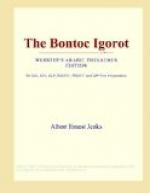In this way they explode their extra emotions and partially work off their disappointment.
Occasionally a town has a bad strain of blood, and two or three men break away without common knowledge and take heads. The entire body of warriors in the pueblo where those murdered lived promptly rises and pours itself unheralded on the pueblo of the murderers. If these people are not warned the slaughter is terrible — men, women, and children alike being slain. None is spared, except mere babes, unless they belong to the offended pueblo, marriage having taken them away from home. Preceding a known attack on a pueblo it is customary for the women and children to flee to the mountains, taking with them the dogs, pigs, chickens, and valuable household effects. However, Bontoc pueblo, because of her strength, is not so evacuated — she expects no enemy strong enough to burst through and reach the defenseless.
In the Banawi area, where the dwellings are built on prominences frequently a hundred or more feet above the surrounding territory, they say the women often remain and assist in the defense by hurling rocks. They are safer there than they would be elsewhere.
Men go to war armed with a wooden shield, a steel battle-ax, and one to three steel or wooden spears. It is a man’s agility and skill in keeping his shield between himself and the enemy that preserves his life. Their battles are full of quick, incessant springing motion. There are sudden rushes and retreats, sneaking flank movements to cut an enemy off. The body is always in hand, always in motion, that it may respond instantly to every necessity. Spears are thrown with greatest accuracy and fatality up to 30 feet, and after the spears are discharged the contest, if continued, is at arms’ length with the battle-axes. In such warfare no attitude or position can safely be maintained except for the shortest possible time.
Challenges and bluffs are sung out from either side, and these bluffs are usually “called.” In the last Bontoc-Tulubin foray a fine, strapping Tulubin warrior sung out that he wanted to fight ten men — he was taken at his word so suddenly that his head was a Bontoc prize before his friends could rally to assist him.
In March we were returning from a trip to Banawi of the Quiangan area, and were warned we might be attacked near a certain river. As we approached it coming down a forested mountain side three or four men were seen among the trees on the farther side of the stream. Presently they called their dogs, which began to bark; then our Bontoc Igorot Constabulary escort “joshed” the supposed enemy by loudly caning dogs and hogs. Presently the calls worked themselves into a rhythmic chorus for all like a strong college yell, “A’-su, a’-su, a’-su, a’-su, fu’-tug, fu’-tug, fu’-tug, fu’-tug.” It is probable the men across the river were hunting wild hogs, but at the time the Constabulary considered the dog calls simply a bluff, which they “called” in the only way they could as they continued down the mountain trail.




